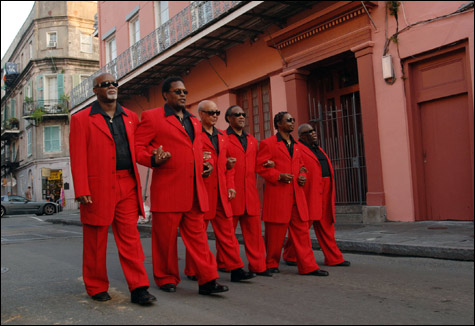
DIVINE PROOF: "When people hear our songs and tell me that we have touched their lives, well, that's what me and the rest of the band are all about," says Jimmy Carter (third from left). |
The double bill of the Blind Boys of Alabama and the Preservation Hall Jazz Band at Symphony Hall on Friday is a match made in New Orleans, where the two venerable groups met to record the Blind Boys' 2008 album. But the music they make together, insists Blind Boys tenor singer Jimmy Carter, comes from a higher place. "When I am singing, I am an instrument of God, and all of the music we make is carrying his message. I am his spirit. And when people hear our songs and tell me that we have touched their lives, well, that's what me and the rest of the band are all about."If that seems a bit pretentious, consider the band's history, which Carter describes as a "mission." It began in 1939 when a group of students at the Talladega Institute for the Blind led by lion-voiced baritone Clarence Fountain banded together as the Five Blind Boys of Alabama. Carter joined five years later, while the group were touring the tent-revival circuit and performing on radio like their heroes, the Golden Gate Quartet.
"We were influenced by them and the Soul Stirrers and the Pilgrim Travelers," he explains over the phone from his 102-year-old mother's house in Alabama. "My voice was a little less scratchy back then, but it's still in good shape. The secret is getting plenty of rest." Even though these singing septuagenarians play 150 to 200 shows a year, Carter does get more sleep than he did during his first 57 years with the band — especially in the early years, when low-paying one-nighters in churches, tents, and community centers were the norm.
Although the Blind Boys' recording career began in 1948, it wasn't till 2001 and Spirit of the Century (Real World) that they crossed over to the mainstream and became a festival and major-concert headliner. That disc's covers of Tom Waits, Ben Harper, and Rolling Stones songs — along with producer John Chelew's rock-savvy arrangements — took them to a new, younger audience. The cover of Waits's "Way Down in the Hole" became the themesong for the first season of HBO's The Wire, in June 2002.
The series of discs they've made since have done the same thanks to their album-to-album reinvention. In 2002, Higher Ground (Real World) found them diving into blues, soul, and reggae. For last year's Down in New Orleans (Time Life), they convened in the Crescent City over a songbook that included tunes by that music mecca's greatest gospel voice, Mahalia Jackson, "Down by the Riverside," and the traditional blues spiritual "You Got To Move." They were joined in the studio by the Hot 8 Brass Band and pianist Allen Toussaint.
And, of course, by the Preservation Hall Jazz Band, who are also an institution. Although they were formed in the '60s, they play a repertoire of New Orleans jazz that's rooted in the earliest emanations of the style, one that goes back to the early 1900s. Their collaborations with the Blind Boys on "Down by the Riverside," "Across the Bridge," and the Staple Singers' "Uncloudy Day" are richly arranged, with the PHJB's melody lines and rhythms underscoring the Blind Boys' deep, resonant harmonies.
Those songs — with their watery imagery — all take on new connotations post-Katrina. "We played a concert in New Orleans while we were recording," says Carter. "We told the people that we don't know how to use hammers and nails, but we hoped to encourage them and lift their spirits with our music." That show was one of the Blind Boys' increasingly rare performances with founder Fountain. He's had to retire from touring because of diabetes and other health issues. Carter took over the group's leadership last year.
At Symphony Hall, the Blind Boys and the Preservation Hall Jazz Band will play together during their individual sets. And at some point Carter's likely to take one of his trademark literal leaps of faith off the stage and dash through the crowd. Where does a sightless man in his late 70s get the confidence to jump off a stage?
"I'm a young guy," declares Carter, who refuses to reveal his age, allowing only that he's "over 50."
"I've got the energy, and I figure the Lord's gonna take care of me," he continues. "So when the Spirit moves me, I move."
BLIND BOYS OF ALABAMA AND THE PRESERVATION HALL JAZZ BAND | Symphony Hall, 301 Mass Ave, Boston | March 27 at 8 pm | 617.876.4275 orwww.crasharts.org